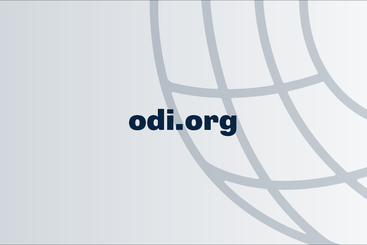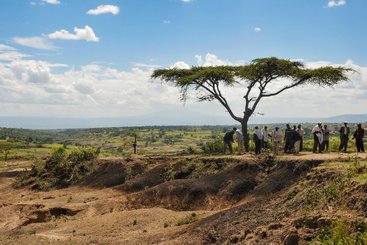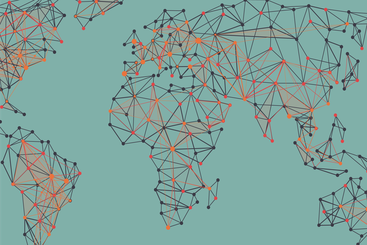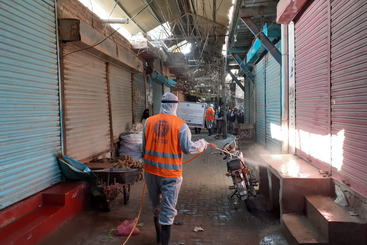
Local humanitarian action
Local humanitarian organisations are, in the main, the first to respond to disasters, conflicts and displacement. During the Covid-19 pandemic, these actors stepped up again, delivering medical and other essential supplies to those directly affected by the virus, its secondary impacts and other ongoing crises. Despite receiving far less funding than their international counterparts, these actors continued to form the backbone of many humanitarian responses during the pandemic.
This year, HPG applied its longstanding expertise on the ‘localisation’ agenda to investigate how Covid-19 impacted local humanitarian responses. With the work of international organisations disrupted, there was optimism that the pandemic would usher in greater support and recognition for local humanitarian action as the crucial work of local responders attracted greater global attention. Utilising research methods including practitioner ‘diaries’, HPG found standout examples of local organisations responding to needs and driving the localisation agenda forward, including through new peer networks, funding sources and joint advocacy. A case study in Afghanistan and Pakistan found an increased reliance on local organisations to deliver assistance, which resulted in them taking on greater risk and responsibilities, though, crucially, not increased funding.
While Covid-19 has sometimes catalysed local innovation, HPG found enduring negative perceptions around risk and capacity, as well as incentives on the part of international actors to maintain power and privilege. These are key barriers to wider change in the system, despite Covid-19. Along with operational actors, donors have a decisive role in overcoming such obstacles and driving localisation. Throughout 2021, HPG convened a range of public events, roundtable discussions and bilateral briefings with these key actors and, through conducting an in-depth review of the agenda’s evidence base, proposed strategic recommendations for those that fund responses. Developing common risk-sharing agendas, supporting and investing in developing equal partnerships and, importantly, increasing the quality and quantity of funding to local actors are among the most urgent actions needed to support local humanitarian action.
HPN also furthered debates on a number of areas related to localisation, including on whether a shift in resources away from international assistance is necessary for local leadership to occur; on the controversial practice of international non-government organisations (INGOs) ‘nationalising’ country offices as a means of ‘localising’ their operations; and countering accusations that local action is more susceptible to corruption. As HPN contributing authors also stressed, such issues are also increasingly intertwined with questions of power, colonialism and race, and an overly technical approach to localisation risks failing to address the root causes of current, unequal practices in the aid sector. As HPG has also discussed, the agenda has implications for how research organisations conduct their work, with co-production practices presenting an opportunity to rebalance partnerships.
Humanitarian Exchange 79: Localisation and local humanitarian action
The theme of this Humanitarian Practice Network (HPN) edition of Humanitarian Exchange is localisation and local humanitarian action. Localisation has gone from a fringe conversation among policy-makers and aid agencies in 2016 to a formal priority under the Grand Bargain. Yet progress has been slow and major gaps remain between the rhetoric around humanitarian partnerships, funding and coordination and practices on the ground.
The SOS Sahel UK story: the journey from one international to four national NGOs
This HPN Network Paper tells the story of SOS Sahel UK, from its registration as an INGO in the UK in 1983 to its closure in 2020. The paper discusses SOS Sahel UK’s long-term, participatory and locally-owned approach to natural resource management (NRM) in the drylands of the Sahel and how the approach evolved throughout the 1980s and 1990s. It also reflects on SOS Sahel’s journey of ‘localisation’ in Sudan, Ethiopia, Mali and Niger and why it differs from approaches taken by many INGOs, providing an analysis of the challenges faced, the mistakes made, as well as the factors contributing to success.

Humanitarian Practice Network Insights
Corruption and the localisation of humanitarian action - by Hugo Slim
Investing in a localised aid system must not mean stepping back from international assistance - by Gareth Price-Jones
Markets and localisation: empowering Turkana fisherfolk in Kenya - by Lucia Epur Lebasha and Xaver Wegler
How Covid-19 has catalysed local innovation - by Susana Fnu
Can INGOs go national in the Global South without recolonising aid? - by Leela Ramdhani, Ahmed Abdi Ibrahim, Lydia Zigomo and Carlos Mejía
Localisation, racism and decolonisation: Hollow talk or real look in the mirror? - by Smruti Patel



